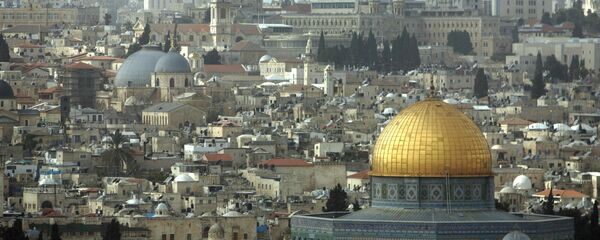"Any kind of negotiations should be based on the UN resolutions and also be guaranteed by timetables. The United Nations should be a major player [in the talks]," Qawasmi said on the sidelines of the Valdai Discussion Club’s Middle East Conference.
According to Qawasmi, Russia can play a greater role in Israeli-Palestinian settlement, having balanced relations with both sides of the conflict, but may need the help of other mediators, such as the European Union, China, the League of Arab States and the United States.
"On our part, we welcome any kind of a Russian involvement in the settlement of this conflict, we believe that Russia can play a balanced role. Maybe Russia also needs other partners as mediators, like it was on the Iranian issue, six parties. Such mediators can be the EU, China, the Arab League, maybe even the United States," Qawasmi said on the sidelines of the Valdai Discussion Club’s Middle East Conference.
The lawmaker pointed out that Russia may play an important role in the conflict's settlement as it had good relations with both Israel and Palestine.
"We believe that the Russian role is very important. And we believe that Russia can play a greater role on this issue [Israeli-Palestinian settlement], because Russia has good relations with both [Palestine and Israel]," Qawasmi noted.
He said that there was even a proposal on holding an international conference on the conflict in Russia. The initiative was supported by Abbas but rejected by Israeli Prime Minister Benjamin Netanyahu.
"I think Israeli still does not have a path toward peace… There live many people with really fanatic ideas, which really contribute in a very bad way to the ideas even of people, who are secular. There is a struggle inside Israel between fanatics and people who believe in a secular state," Qawasmi added.
Historical Background of the Conflict
The relations between the Palestinians and Israelis have been strained for decades as Israel has been objecting the establishment of the Palestinian state on the territories of the West Bank, including East Jerusalem, which are partially occupied by Israel, and the Gaza Strip. Direct talks on the settlement of the conflict between the parties collapsed in 2014.
The United Nations, which sees Israel as the power which has been occupying Palestinian territories since 1967, has adopted dozens of resolutions in a bid to settle the decades-long conflict.
According to the resolution, such Israel's activities do not allow for implementation of the two-state solution for the crisis settlement, implying the creation of an independent and sovereign Palestinian state within the borders set prior to the Six Day War in 1967, when Israel seized the West Bank, Gaza Strip, Golan Heights and the Sinai Peninsula.
READ MORE: Palestine Refuses to Deal With US as Sole Mediator in Mideast Talks — Abbas
Furthermore, the relations between two states deteriorated after US President Donald Trump's decision to recognize Jerusalem as the capital of Israel made on December 6. The president instructed the US Department of State to move the embassy from Tel Aviv. Trump's move has caused a huge wave of criticism in numerous countries, including in the Arab states.



